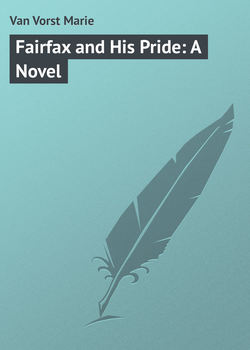Читать книгу Fairfax and His Pride: A Novel - Van Vorst Marie - Страница 13
BOOK I
THE KINSMEN
CHAPTER XIII
ОглавлениеThe sculptor Cedersholm had come from Sweden himself a poor boy. He had worked his way into recognition and fame, but his experience in life had embittered rather than softened him. He early discovered that there is nothing but example that we can learn from the poor or take from the poor, and he avoided everything that did not add to his fame and everything that did not bring in immediate aids. It was only during the late years that he had made his name known in New York. He had been working in Rome, and during the past three years his expositions had made him enormously talked of. He would not have dined at the Carews' without a reason. Henry Carew was something of a figure in the Century Club. His pretence to dilettantism was not small. But Cedersholm had not foreseen what a wretched dinner he would be called on to eat. Cooked by a woman hired in for the day, half cold and wholly poor, Mr. Carew's banquet was far from being the magnificent feast it seemed in Bella's eyes. Somewhat cheered by his cigar and liqueur, Cedersholm found a seat in a small reception room out of earshot of his host and hostess, and, in company with Canon Prynne of Albany, managed to pass an agreeable half hour.
The Canon agreed with the Swede – he had never heard a bird sing so divinely.
"I told Mrs. Carew she should throw a scarf over the cage. The blackbird will sing his heart out."
The sculptor took up his conversation with his friend where he had left it in the dining-room. He had been speaking of a recent commission given him by the city for an important piece of work to be done for Central Park.
"You know, Canon, we have succeeded in bringing to the port of New York the Abydos Sphinx – a marvellous, gigantic creature. It is to be placed in Central Park, in the Mall."
This, Canon Prynne had heard. "The base pedestal and fixtures are to be yours, Cedersholm?"
The sculptor nodded. "Yes, and manual labour such as this is tremendous. If I were in France, now, or in Italy, I could find chaps to help me. As it is, I work alone." After a pause, he said, "However, I like the sole responsibility."
"Now, I am not sure," returned his companion, "whether it is well to like too sole a responsibility. As far as I am concerned, no sooner do I think myself important than I discover half a dozen persons in my environment to whom I am doing a wrong, if I do not invite them to share my glory."
There was no one in the small room to which the gentlemen had withdrawn, and their chat was suddenly interrupted by a small, clear voice asking, "Is this Mr. Cedersholm?" Neither guest had seen steal into the room and slip from the shadow to where they sat, a little girl, slender, overgrown, in a ridiculously short dress, ridiculous shoes and stockings, her arms full of treasures, her dark hair falling around her glowing cheeks, in terror of being caught and banished and punished; but ardent and determined, she had nevertheless braved her father's displeasure. Bella fixed her eyes on the sculptor and said rapidly —
"Excuse me for coming to father's party, but I am in a great hurry. I want to speak to you about my Cousin Antony. He is a great genius," she informed earnestly, "a sculptor, just like you, only he can't get any work. If he had a chance he'd make perfectly beautiful things."
The other gentleman put out his hand and drew the child to him. Unused to fatherly caress, Bella held back, but was soon drawn within the Canon's arm. She held out her treasures: "He did these," and she presented to Cedersholm the white cast of her own foot.
"Cousin Antony explained that it is only a cast, and that anybody could do it, but it is awfully natural, isn't it? only so deadly white."
She held out a sheet of paper Fairfax had left at the last lesson. It bore a sketch of Bella's head and several decorative studies. Cedersholm regarded the cast and the paper.
"Who is Cousin Antony, my child?" asked the Canon.
"Mother's sister's son, from New Orleans – Antony Fairfax."
Cedersholm exclaimed, "Fairfax; but yes, I have a letter from a Mr. Fairfax. It came while I was in France."
The drawing and the cast in Cedersholm's possession seemed to have found their home. Bella felt all was well for Cousin Antony.
"Oh, listen!" she exclaimed, eagerly, "listen to our blackbird. Isn't it perfectly beautiful?"
"Divine indeed," replied the clergyman. "Are you Carew's little daughter?"
"Bella Carew. And I must go now, sir. Arabella is my real name."
She slipped from under the detaining arm. "Nobody knows I'm up. I'll lend you those," she offered her treasures to Cedersholm, "but I am very fond of the foot."
It lay in Cedersholm's hand without filling it. He said kindly —
"I quite understand that. Will you tell your Cousin Antony that I shall be glad to see him?"
"Oh, thank you," she nodded. "And he'll be very glad to see you."
Cedersholm, smiling, put the cast and the bit of paper back in her hands.
"I won't rob you of these, Miss Bella. Your cousin shall make me others."
As the little girl ran quickly out it seemed to the guests as if the blackbird's song went with her, for in a little while Jetty stopped singing.
"What a quaint, old-fashioned little creature," Cedersholm mused.
"Charming," murmured Canon Prynne, "perfectly charming. Now, my dear Cedersholm, there's your fellow for the Central Park pedestal."
